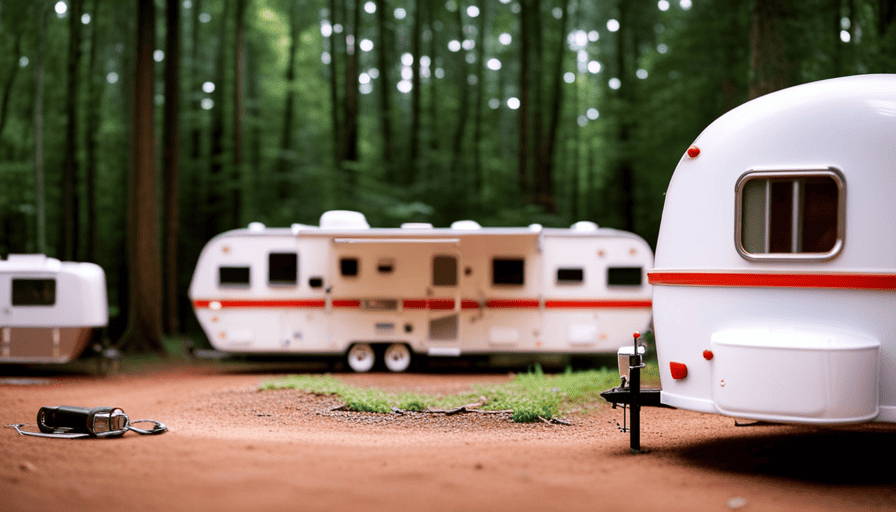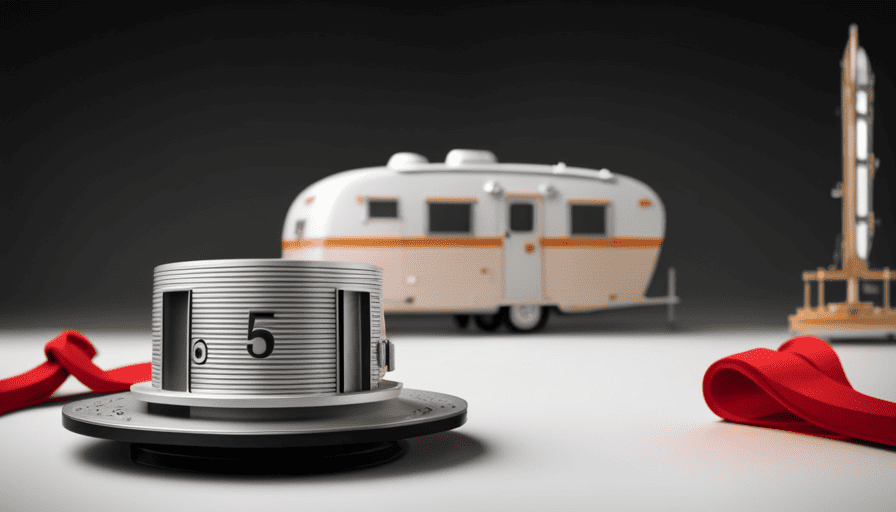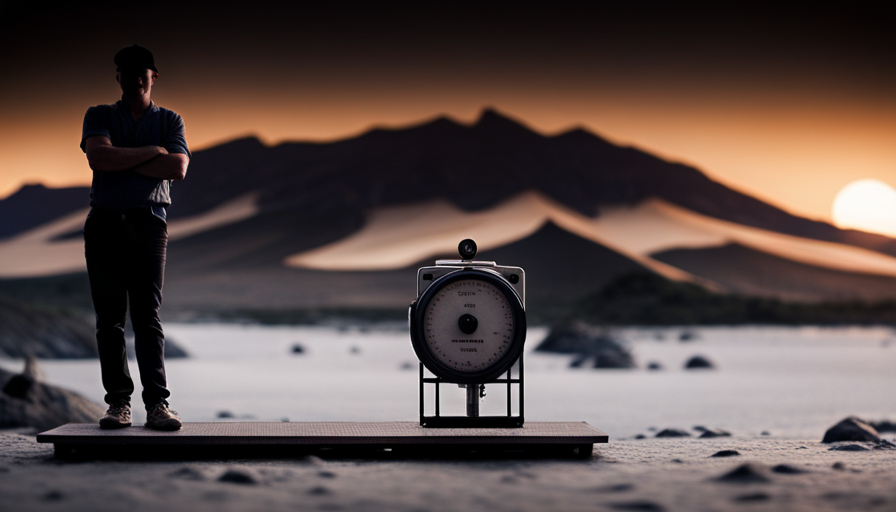Have you ever fantasized about cruising on the open highway, in search of adventure and liberty? If that’s the case, you’re in good company. A growing number of individuals are opting for camper trailers as their mode of exploration into the vast wilderness, all while retaining the homey comforts. However, prior to setting off on this thrilling adventure, understanding the expense associated with acquiring a camper trailer is crucial.
The price of a camper trailer can vary greatly depending on several factors. These include the type of camper trailer, whether it’s new or used, and additional expenses such as maintenance and insurance. By understanding these factors and doing some research, you can make an informed decision about how much you’re willing to invest in your camper trailer.
In this article, I will explore the different factors that influence camper trailer prices, the types of camper trailers available, and the pros and cons of buying new versus used. I will also discuss how to budget for a camper trailer, research prices, and consider additional expenses. Whether you’re considering renting or buying a camper trailer, this article will help guide you in making the right investment for your adventurous spirit.
Key Takeaways
- The cost of a camper trailer varies based on factors such as type, new or used, and additional expenses.
- Researching prices and comparing options is important when buying a camper trailer.
- Different types of camper trailers are available, each with their own advantages and cost implications.
- Timing your purchase and negotiating with sellers can help in getting the best deal on a camper trailer.
Factors Influencing Camper Trailer Prices
If you’re looking to buy a camper trailer, you’ll quickly realize that there are various factors that can greatly impact the price you’ll end up paying. One of the first things you’ll need to do is research prices and compare options. This will give you a good idea of the range of prices you can expect to find for camper trailers.
It’s important to note that the cost of a camper trailer can vary greatly depending on factors such as size, brand, features, and condition. Larger trailers generally cost more than smaller ones, and well-known brands tend to come with a higher price tag. Additionally, trailers with more features, such as a kitchen or bathroom, will typically be more expensive. The condition of the trailer can also affect its price, with newer models generally costing more than older ones.
By researching prices and comparing options, you’ll be able to find a camper trailer that fits your budget and meets your needs.
Now, let’s move on to the next section and discuss the different types of camper trailers.
Types of Camper Trailers
There are various types of camper trailers available in the market, each offering unique features and amenities. When it comes to choosing the right camper trailer, it’s important to consider the type of accessories that come with it.
Some camper trailers are equipped with built-in kitchens, bathrooms, and even air conditioning systems, while others may have more basic amenities. Depending on your needs and preferences, you can opt for a camper trailer that suits your lifestyle.
One popular type of camper trailer is the pop-up camper. These trailers are lightweight and compact, making them easy to tow and maneuver. They usually come with a foldable canvas top, which can be raised to provide additional headroom and sleeping space.
Another type is the teardrop camper, which is known for its aerodynamic design and compact size. These trailers are perfect for solo travelers or couples who prefer a minimalist camping experience.
On the other hand, larger camper trailers like travel trailers and fifth wheels offer more space and amenities. These trailers often come with full kitchens, bathrooms, and spacious living areas. They can accommodate larger groups of people and provide a more comfortable camping experience.
Each type of camper trailer design has its own pros and cons. Pop-up campers and teardrop trailers are lightweight and easy to tow, but they may lack some of the amenities that larger trailers offer. Travel trailers and fifth wheels, on the other hand, provide more space and amenities, but they can be heavier and more difficult to tow.
There are various types of camper trailers available, each with its own set of features and advantages. When choosing a camper trailer, consider the type of accessories you need and the pros and cons of different designs. This will help you find the perfect camper trailer that suits your camping needs.
Moving on to the next section, let’s explore the differences between new and used camper trailers.
New vs. Used Camper Trailers
When it comes to purchasing a camper trailer, it’s important to consider whether to buy new or used.
One of the main factors to consider is the price. New camper trailers generally come with a higher price tag compared to used ones. The price of a new camper trailer can range anywhere from $10,000 to $50,000 or more, depending on the size, features, and brand. On the other hand, used camper trailers can be significantly cheaper, with prices starting as low as $2,000 for older models.
There are pros and cons to both options. When buying new, you have the advantage of getting a camper trailer that is in pristine condition and comes with a warranty. You can also customize it to your liking and have the latest features and technology. However, the higher price can be a deterrent for some buyers.
On the other hand, buying a used camper trailer allows you to save money upfront. You can find good deals on used trailers that are still in good condition. However, there may be some wear and tear, and you may not have access to the latest features or warranties.
Transitioning into the subsequent section about budgeting for a camper trailer, it’s important to consider the cost of maintenance and repairs, regardless of whether you choose to buy new or used.
Budgeting for a Camper Trailer
Budgeting for a camper trailer can be a challenge, but it’s crucial to plan ahead and allocate funds accordingly. When it comes to saving strategies for buying a camper trailer, there are a few things to consider.
First and foremost, determine your budget and stick to it. Consider how much you can comfortably afford to spend on a camper trailer without compromising your financial stability. Additionally, start saving early and set aside a specific amount of money each month to go towards your camper trailer fund. This way, you’ll gradually accumulate the necessary funds without feeling overwhelmed by a large lump sum.
Factors to consider when setting a budget for a camper trailer include the type of trailer you want, the size and features you require, and whether you prefer a new or used trailer. New trailers tend to be more expensive, but they come with warranties and the latest features. On the other hand, used trailers can be more budget-friendly, but you need to thoroughly inspect them for any potential issues.
Researching camper trailer prices is the next step in the process, as it will help you determine a realistic budget and narrow down your options. By considering different models, brands, and dealerships, you can find a camper trailer that fits your needs and budget perfectly.
Researching Camper Trailer Prices
To find the perfect camper trailer for your needs, start exploring the prices of these cozy and convenient mobile retreats. Researching camper trailer brands and comparing their features is an essential step in finding the right fit for your budget and requirements.
When researching camper trailer prices, it’s important to consider different brands and models. Each brand offers various options, from basic to luxurious, with corresponding price ranges. By comparing the features and amenities offered by different brands, you can determine which camper trailer offers the best value for your money.
One way to research camper trailer prices is by visiting dealerships or attending RV shows. This allows you to see the trailers in person and get a feel for their quality and features. Additionally, you can take advantage of online resources, such as manufacturer websites and online marketplaces, to compare prices and read customer reviews.
By thoroughly researching camper trailer prices, you can make an informed decision and ensure that you are getting the best deal. In the next section, we will discuss some tips for getting the best deal on a camper trailer without compromising on quality or features.
Tips for Getting the Best Deal
When it comes to getting the best deal on a camper trailer, there are a few key points to consider.
First, timing your purchase can make a big difference in the price you pay, as sellers may be more willing to negotiate during certain times of the year.
Additionally, negotiating with sellers is a crucial skill to master, as it can help you save even more money.
Lastly, don’t forget to explore alternative options such as renting or leasing, as they may offer a more cost-effective solution for your camping needs.
Timing Your Purchase
If you’re looking to time your purchase just right, you might want to consider the best season to snag a great deal on a camper trailer. Timing advantages can play a significant role in getting the best price.
Market trends show that the best time to buy a camper trailer is during the offseason when demand is lower. This is typically in the fall or winter months when people are less likely to be camping. During this time, dealerships and private sellers may be more willing to negotiate and offer discounts to move inventory. By taking advantage of this timing, you can potentially save a significant amount of money on your camper trailer purchase.
With this in mind, let’s now explore tips for negotiating with sellers to get the best possible deal without compromising on quality or features.
Negotiating with Sellers
Navigating the art of negotiation can be like embarking on a thrilling adventure, where you have the power to sway sellers and secure the best possible deal for your dream camper trailer. To help you in this exhilarating journey, here are three essential negotiation strategies to keep in mind:
-
Research and knowledge: Before entering into negotiations, gather information about the market value of camper trailers similar to the one you desire. This will give you a solid foundation to negotiate from and prevent the seller from taking advantage of your lack of knowledge.
-
Setting a budget: Establishing a budget beforehand will help you determine your maximum offer and prevent overspending. Stick to your budget and be prepared to walk away if the seller is not willing to meet your terms.
-
Stay confident and calm: During negotiations, it’s crucial to remain composed and confident. Avoid showing too much enthusiasm or desperation, as it may weaken your bargaining power.
By employing these negotiation strategies and setting a budget, you can increase your chances of securing an excellent deal on your camper trailer. As you consider off-season sales and promotions, keep in mind these tactics to further enhance your negotiation skills.
Considering Off-Season Sales and Promotions
Take advantage of off-season sales and promotions to score great deals on your dream camper trailer. Many dealerships and manufacturers offer significant discounts during the off-season, when demand is lower. This is the perfect time to find a camper trailer at a discounted price. Additionally, keep an eye out for holiday promotions, as dealerships often offer special deals during major holidays such as Memorial Day, Independence Day, and Labor Day. These promotions can include discounts, free upgrades, or even financing options. To give you an idea of the potential savings, consider the following table:
| Camper Trailer Model | Original Price | Off-Season Discount | Holiday Promotion |
|---|---|---|---|
| Model A | $30,000 | $5,000 | Free upgrade |
| Model B | $35,000 | $7,000 | $1,000 off |
| Model C | $40,000 | $8,000 | Financing option |
By taking advantage of off-season discounts and holiday promotions, you can save a significant amount of money on your camper trailer purchase. When considering alternative options such as renting or leasing, it’s important to weigh the pros and cons to make an informed decision.
Exploring Alternative Options (Renting, Leasing, etc.)
Considering alternative options such as renting or leasing can provide flexibility and affordability when exploring your camper trailer dreams. Leasing options allow you to enjoy the benefits of a camper trailer without the commitment of ownership. With leasing, you can choose a short-term contract that suits your needs, whether it’s for a weekend getaway or a longer road trip.
This can be a cost-effective solution, especially if you only plan to use a camper trailer occasionally. On the other hand, short-term rentals provide a convenient option for those who don’t want the responsibility of maintenance and storage. Renting allows you to experience the joy of camping without the long-term financial commitment.
Transitioning into the subsequent section about maintenance and insurance costs, it’s important to consider these factors when deciding between renting, leasing, or purchasing a camper trailer.
Maintenance and Insurance Costs
Maintaining and insuring a camper trailer can be like tending to a delicate garden, as both require regular attention and care to ensure their longevity and protection. When it comes to maintenance costs, it’s important to budget for routine tasks such as cleaning, servicing, and repairs. Regular cleaning helps prevent rust and deterioration, while servicing ensures that the trailer’s mechanical components are in good working order. Repairs, on the other hand, can range from minor fixes like replacing a broken lightbulb to more significant repairs like fixing a leaky roof.
In terms of insurance coverage, it is crucial to protect your investment and be prepared for unexpected events. Insurance policies for camper trailers typically cover damage from accidents, theft, vandalism, and natural disasters. The cost of insurance will depend on factors such as the value of the trailer, its age, and your location. It is advisable to compare quotes from different insurance providers to find the best coverage at a reasonable price.
To help visualize the potential costs associated with maintenance and insurance, the following table provides an overview:
| Maintenance Costs | Insurance Coverage |
|---|---|
| Cleaning supplies | Accidental damage |
| Servicing | Theft |
| Repairs | Vandalism |
| Natural disasters |
Considering these ongoing expenses, it is important to also be aware of additional expenses to consider when owning a camper trailer.
Additional Expenses to Consider
Now that we’ve covered the maintenance and insurance costs of owning a camper trailer, let’s dive into some additional expenses that you should consider. It’s important to be aware of these hidden costs of camper trailer ownership to ensure that you have a realistic budget in place.
One of the main additional expenses for camping trips is the cost of campground fees. Depending on the location and amenities, these fees can vary greatly. It’s also important to factor in the cost of fuel for towing your camper trailer to different destinations. Additionally, you may incur expenses for things like firewood, propane, and other camping supplies.
Another expense to consider is the cost of storage. If you don’t have enough space to keep your camper trailer on your property, you may need to rent a storage facility, which can add up over time.
Lastly, don’t forget to budget for any repairs or maintenance that may arise. Just like any vehicle, camper trailers require regular upkeep to ensure they remain in good condition.
Understanding these additional expenses will help you make a more informed decision about whether owning a camper trailer is the right choice for you. So, let’s now move on to the next section and explore the differences between renting and buying a camper trailer.
Renting vs. Buying a Camper Trailer
When it comes to owning a camper trailer, the decision between renting and buying can have a significant impact on your overall camping experience.
There are pros and cons to both options. Buying a camper trailer gives you the freedom to customize it to your liking and use it whenever you want. It also allows you to build equity in an asset that may appreciate over time. However, buying a camper trailer requires a significant upfront investment. You will need to consider the cost of purchasing the trailer, as well as insurance, maintenance, and storage fees.
On the other hand, renting a camper trailer can be a more cost-effective option if you only plan to use it occasionally. Renting allows you to try out different models and sizes without the long-term commitment. However, you may be limited in terms of customization options and availability.
Ultimately, the decision between buying and renting a camper trailer depends on your camping frequency, budget, and personal preferences. Making your camper trailer investment is an important step towards enjoying the great outdoors with comfort and convenience.
Making Your Camper Trailer Investment
Investing in a camper trailer allows me to embark on countless adventures and create lasting memories in the great outdoors. When considering the financial aspect of this investment, it’s important to explore camper trailer financing options.
One of the advantages of camper trailer ownership is the potential for cost savings. Instead of spending money on hotels or vacation rentals, I have the convenience of having my own accommodation wherever I go. This can significantly reduce travel expenses in the long run. Additionally, owning a camper trailer gives me the freedom to explore different destinations without the need to book in advance or worry about availability.
However, it’s crucial to consider the cons of camper trailer ownership as well. The initial cost of purchasing a camper trailer can be quite high, depending on the size and features. Additionally, there are ongoing expenses such as insurance, maintenance, and storage fees. These costs should be taken into account when deciding whether to invest in a camper trailer.
When it comes to financing, there are various options available. Some people choose to pay for their camper trailer upfront, while others opt for financing through loans or leasing. It’s important to carefully assess the terms and interest rates before committing to any financing option.
Overall, investing in a camper trailer can provide endless opportunities for outdoor adventures. However, it’s essential to weigh the pros and cons of ownership and carefully consider the financial aspects before making this investment.
Frequently Asked Questions
How long does a camper trailer typically last before needing major repairs or maintenance?
A camper trailer typically lasts around 10-20 years before needing major repairs or maintenance. However, this can vary depending on factors like usage, maintenance, and the quality of the trailer. Common repairs that may be needed include fixing leaks, replacing appliances or components, and repairing or replacing the roof. Regular maintenance, such as checking for water damage and keeping up with routine inspections, can help prolong the lifespan of a camper trailer.
What is the average cost of camper trailer insurance?
It’s ironic how we invest in a camper trailer to escape the worries of the world, only to be burdened with the cost of insurance.
The average cost of camper trailer insurance depends on various factors such as the coverage you choose, the value of your trailer, your driving history, and where you live.
Additionally, factors like the type of trailer, its age, and security measures can also affect the insurance premiums.
Are there any hidden expenses or additional costs associated with owning a camper trailer?
There can be hidden expenses and additional costs associated with owning a camper trailer. These can include maintenance costs for regular upkeep and repairs, as well as expenses for storage, registration, and insurance.
Additionally, there may be costs for accessories and upgrades to enhance the functionality and comfort of the trailer. It’s important to budget for these expenses to ensure a smooth ownership experience.
Is it more cost-effective to rent a camper trailer for occasional use rather than buying one?
When considering whether it’s more cost-effective to rent or buy a camper trailer for occasional use, there are pros and cons to consider.
Renting a camper trailer allows for flexibility and eliminates the need for long-term storage and maintenance costs. However, buying a camper trailer may be more cost-effective in the long run if you plan to use it frequently.
It ultimately depends on your individual needs and usage patterns.
What are some tips for negotiating the best price when purchasing a camper trailer?
When it comes to negotiating the best price for a camper trailer, there are a few effective tactics to keep in mind.
Firstly, do your research and be knowledgeable about the market value of the trailer you’re interested in.
Secondly, be prepared to walk away if the price isn’t right. This shows the seller that you’re serious about getting the best deal.
Lastly, don’t be afraid to negotiate and make counteroffers. Remember, the goal is to reach a mutually beneficial agreement.
What is the Average Cost of a Camper Trailer?
The camper trailer price explained can vary greatly depending on factors such as brand, size, and features. On average, a new camper trailer can range from $10,000 to $50,000, while used options can be found for as low as $5,000. It’s essential to consider maintenance expenses, insurance costs, and additional accessories when budgeting for a camper trailer.
Conclusion
In conclusion, after diving into the world of camper trailer prices, it’s clear that this investment is no walk in the park. It’s like embarking on a thrilling adventure, where the cost is not just measured in dollars, but also in the memories and experiences that await.
From considering factors like type and condition, to budgeting for maintenance and insurance, there is much to ponder. But fear not, for with diligent research and careful planning, the road to finding the perfect camper trailer can lead to a lifetime of unforgettable journeys.










